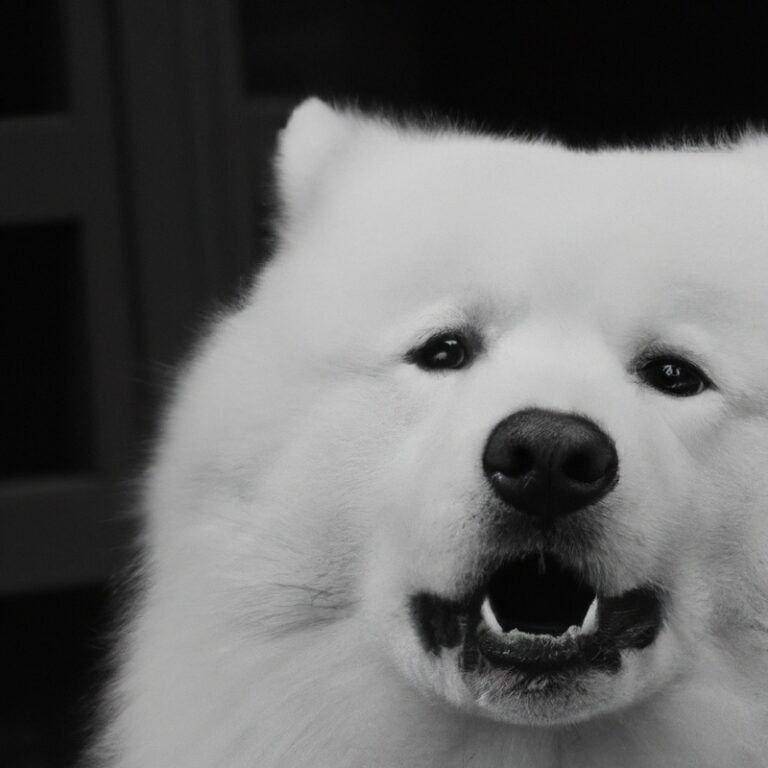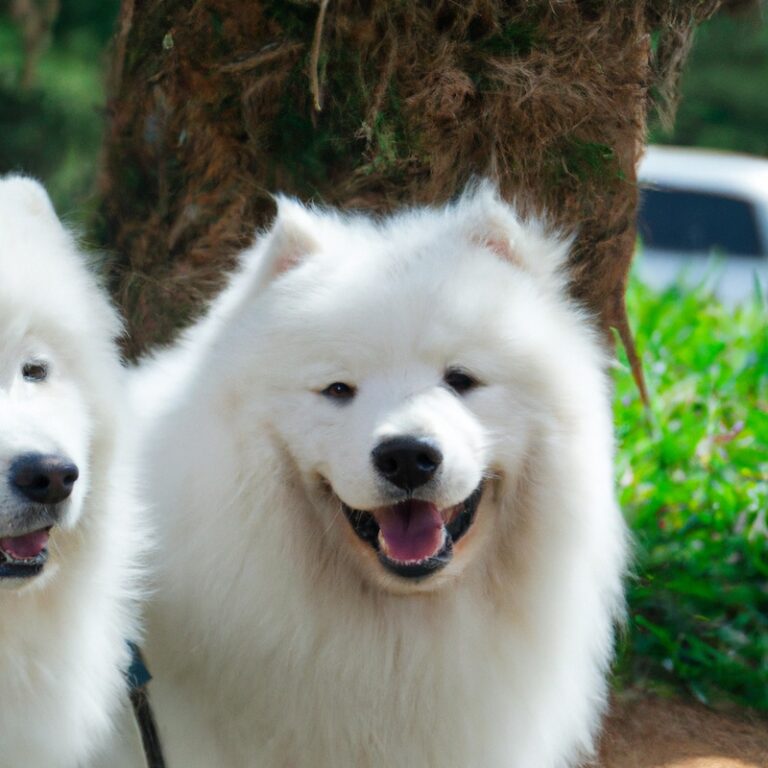How To Handle Samoyed Stubbornness During Training?
Key Takeaways:
- Consistency and patience are key in training a stubborn Samoyed.
- Positive reinforcement techniques work best to motivate and engage a stubborn Samoyed during training.
- Prioritize socialization to help reduce stubborn behavior in Samoyeds.
- Seek professional help if you’re struggling with handling a stubborn Samoyed during training.
Are you struggling with training your Samoyed?
Trust me, you’re not alone.
Samoyeds are famously charming and fluffy, but they also come with a reputation for stubbornness.
As a proud owner of a Samoyed, I know firsthand the unique challenges that come with training this lovable but independent breed.
In this article, I’m going to share some effective techniques to handle Samoyed stubbornness during training.
From understanding their breed characteristics to addressing the root causes of stubbornness, we’ll explore how to establish a strong bond with your Samoyed and reinforce obedience commands.
Say goodbye to training obstacles and hello to a well-behaved Samoyed!
| Challenges | Solutions |
|---|---|
| 1. Samoyeds can be independent and stubborn. | 1. Be patient and consistent with training. |
| 2. They may get easily distracted during training. | 2. Establish a calm and quiet training environment. |
| 3. Samoyeds can exhibit selective hearing. | 3. Use high-value treats and positive reinforcement techniques. |
| 4. They may resist following commands when not interested. | 4. Make training sessions fun and engaging with toys or games. |
| 5. Samoyeds have a strong will and may test boundaries. | 5. Set clear rules and establish yourself as the pack leader. |
Understanding the Samoyed Breed
Characteristics of Samoyeds
Samoyeds are known for their friendly and outgoing nature.
They have a gentle temperament and are great with kids, making them excellent family pets.
These dogs are also highly intelligent and love to please their owners.
Their thick, white coats are not only beautiful but also serve as insulation, keeping them warm in cold weather.
Samoyeds are natural-born explorers and enjoy outdoor activities.
Additionally, they have a strong prey drive and may chase after smaller animals.
Overall, Samoyeds are loyal, affectionate, and make wonderful companions.

Common Training Challenges with Samoyeds
Training Samoyeds can pose some challenges, but with patience and consistency, you can overcome them. One common challenge is their stubbornness, which can make them resistant to following commands.
To address this, use positive reinforcement techniques and rewards to motivate them.
Another challenge is their high energy levels, so providing plenty of physical exercise and mental stimulation is essential. Lastly, Samoyeds have a tendency to bark, so teaching them the “quiet” command and providing sufficient socialization can help manage this behavior.
Remember, training is an ongoing process, so be patient and consistent with your Samoyed.
Effective Training Techniques for Samoyeds
Positive Reinforcement Training
Positive reinforcement training is a highly effective approach for training Samoyeds.
The key idea is to reward desired behaviors with praise, treats, or play, and to ignore or redirect any unwanted behaviors.
This positive method helps to build a strong bond between you and your Samoyed and motivates them to learn.
Remember to be patient and consistent, and always use positive reinforcement techniques to reward and encourage good behavior.
With time and practice, your Samoyed will become a well-behaved and happy companion.

Consistency and Patience
Consistency and patience are key when it comes to training your Samoyed. By being consistent in your commands and routines, your dog will learn what is expected of them.
Patience is important because every dog learns at their own pace.
It’s important to remember that training takes time and effort. Stay calm and positive, and celebrate small victories along the way.
Keep practicing, be patient, and your Samoyed will thrive with your consistent guidance.
Establishing Clear Boundaries and Rules
Establishing clear boundaries and rules is vital when training a Samoyed.
Here’s what you can do:
- Consistency: Be consistent with your expectations and the consequences for breaking the rules. This helps your Samoyed understand what behaviors are acceptable and what are not.
- Positive Reinforcement: Use positive reinforcement techniques to reward your Samoyed for following the rules. This can include treats, praise, or playtime. It motivates them to repeat the desired behaviors.
- Clear Communication: Use clear and concise commands to communicate your expectations. Avoid confusing or conflicting signals that can lead to misunderstandings.
- Supervision: Supervise your Samoyed closely, especially during the early stages of training. This allows you to catch any rule-breaking behaviors and correct them immediately.
- Redirect and Reinforce: When your Samoyed breaks a rule, redirect their attention to a more appropriate behavior and reinforce it positively. This helps them understand what they should be doing instead.
Remember, consistency and positive reinforcement are key to establishing clear boundaries and rules.
With patience and practice, your Samoyed will understand and respect these boundaries, making training more effective.

Addressing Stubbornness in Samoyeds
Understanding the Cause of Stubbornness
Stubbornness in Samoyeds can stem from a variety of causes. One common reason is their independent nature, as they were bred to work independently in harsh Arctic conditions.
They may resist commands if they feel the task is unnecessary or uninteresting.
Another factor could be a lack of proper training or inconsistency in training methods, leading to confusion and a disregard for commands. Lastly, fear or anxiety may also contribute to stubborn behavior.
Understanding these potential causes can help you tailor your training approach to address and overcome stubbornness in your Samoyed.
Building a Strong Bond with Your Samoyed
Building a strong bond with your Samoyed is essential for a happy and well-behaved companion.
Here are a few tips to help you develop that bond:
- Spend quality time together: Engage in activities that you both enjoy, such as going for walks, playing games, or training sessions.
- Use positive reinforcement: Reward your Samoyed for good behavior with treats, praise, and affection. This will reinforce positive associations and strengthen your bond.
- Be patient and consistent: Training takes time and effort. Stay consistent with your commands and expectations, while being patient and understanding as your Samoyed learns.
- Communicate effectively: Understand your Samoyed’s body language and vocalizations to better communicate with each other. This will deepen your understanding and connection.
- Provide mental and physical stimulation: Samoyeds are intelligent and energetic dogs. Provide them with plenty of exercise, mental stimulation, and interactive toys to keep them engaged and happy.
Remember, building a strong bond with your Samoyed is a continuous process that requires patience, love, and understanding.
By investing time and effort, you’ll establish a deep connection with your furry friend.
Reinforcing Obedience Commands
To reinforce obedience commands in your Samoyed, consistency is key.
Use positive reinforcement techniques such as praise, treats, and playtime rewards to encourage desired behavior.
Keep training sessions short and focused to maintain your dog’s attention and motivation.
Be patient and avoid punishment as it can lead to fear and stubbornness.
Practice commands in different environments and gradually increase distractions to ensure your Samoyed listens to you in all situations.
Regular training and reinforcement will help solidify obedience commands in your furry friend.
Overcoming Training Obstacles with Samoyeds
Dealing with Distractions
Dealing with distractions during training can be a challenge, but there are strategies you can use to stay on track.
Firstly, it’s important to choose a quiet and calm training environment to minimize external distractions.
Keep training sessions short and focused, breaking down tasks into smaller steps.
Use treats or toys as rewards to keep your dog engaged.
If your Samoyed gets easily distracted, try using a leash to maintain their attention.
Remember to be patient and consistent, and gradually increase the level of distractions over time.
Happy training!
Keeping Training Sessions Fun and Engaging
During Samoyed training, it’s important to keep the sessions fun and engaging.
Keep your dog motivated by using positive reinforcement techniques like treats, praise, and play.
Make training feel like a game by using interactive toys or incorporating tricks and commands into everyday activities.
Keep sessions short and focused to avoid boredom, and mix up the routine to keep things interesting.
Remember to always end on a positive note and celebrate your Samoyed’s progress!
Seeking Professional Help if Necessary
If you find that your Samoyed’s stubbornness is becoming too difficult to manage on your own, seeking professional help is a viable option.
A professional dog trainer who specializes in working with stubborn breeds like Samoyeds can offer valuable guidance and techniques to help you overcome training challenges.
They can assess your dog’s behavior, provide personalized training plans, and offer ongoing support to ensure your Samoyed develops the desired behaviors.
Don’t hesitate to reach out to a professional if you need assistance – they can be a valuable resource in your training journey.
Frequently Asked Questions
Why are Samoyeds considered stubborn?
Samoyeds are considered stubborn because of their independent and strong-willed nature. They have a history of being bred for herding and sledding, which required them to think and make decisions on their own.
This independent thinking can sometimes translate into stubbornness during training, as they may challenge commands or prefer to do things their own way.
Effective training methods focusing on positive reinforcement and consistency can help address their stubborn tendencies and make training more successful.
How long does it take to train a Samoyed?
Training a Samoyed can take anywhere from a few weeks to several months, depending on various factors.
The breed is known for their stubbornness, so consistency and patience are key.
Daily training sessions, positive reinforcement, and starting early are important.
Socialization is also crucial to their training.
Remember, every dog is different, so the timeline may vary.
Stay consistent, be patient, and enjoy the process of training your Samoyed.
Can Samoyeds be trained for specific tasks?
Yes, Samoyeds can be trained for specific tasks.
They are intelligent and eager to please, making them great candidates for obedience training, agility, therapy work, and even some specialized tasks such as search and rescue.
However, it’s important to remember that each dog is unique, so training methods may vary.
Consistency, positive reinforcement, and patience are key when working with Samoyeds.
With the right approach, they can excel in various tasks and be a wonderful companion.
Final Verdict
Handling Samoyed stubbornness during training can be challenging, but not impossible.
By understanding their characteristics and utilizing effective training techniques such as positive reinforcement, consistency, and clear boundaries, you can overcome training obstacles with your Samoyed.
Building a strong bond and reinforcing obedience commands are also essential.
Remember to keep training sessions fun and engaging while addressing distractions.
And if needed, don’t hesitate to seek professional help.
With patience, persistence, and a loving approach, you can successfully train your Samoyed and enjoy a well-behaved and happy companion.








